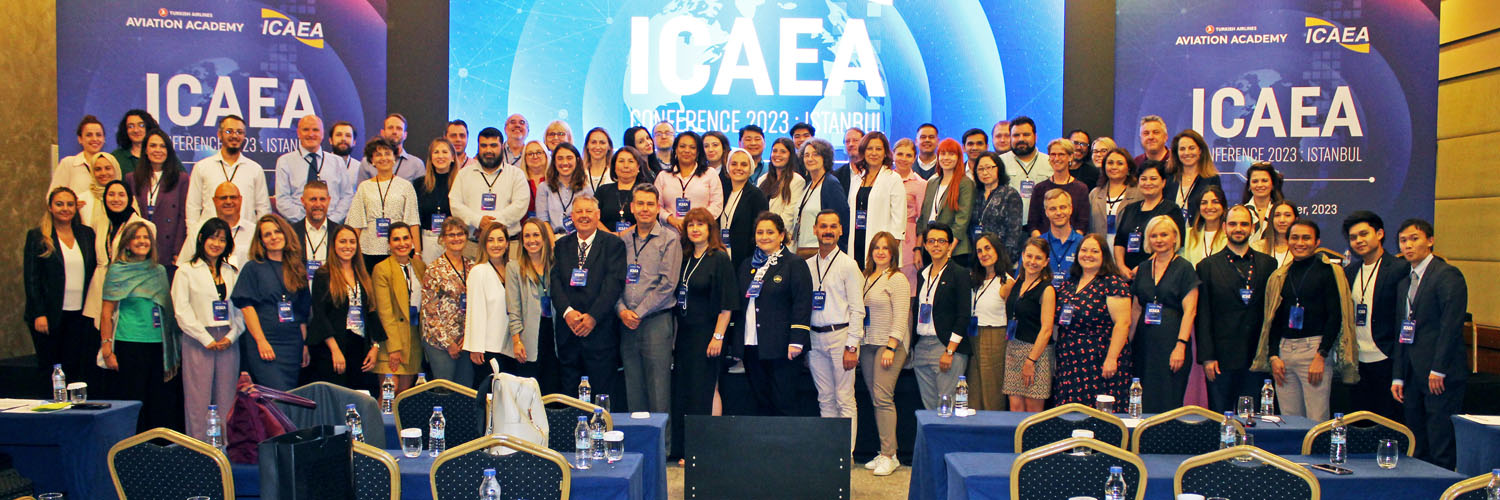Location
Istanbul, Turkey
Presentation Type
Paper
Description
The 2023 International Civil Aviation English Association (ICAEA) International Conference took place in Istanbul, Turkey from September 18th to 20th, as the first face-to-face ICAEA event following the Covid-19 pandemic. Turkish Airlines Aviation Academy served as the conference host, marking the third time they have graciously hosted an ICAEA event. The theme of this year’s conference, Current Trends and Future Perspectives in Aviation English Training: Developing Training for Today and Tomorrow, allowed us to reflect on how technology played a role in Aviation English training and assessment during the pandemic and look forward in regards to how technology will continue to evolve and influence the field in the future.
A truly international event, more than 100 participants attended from over 30 countries. The conference programme was divided into seven sessions, each with a sub-theme linked to the overall conference topic. Morning sessions were filled with presentations, while afternoons contained interactive workshops with hands-on activities for participants to engage with one another, share experiences, and learn techniques and strategies to take home. Day 1 focused on materials design and development; Day 2 looked at the role of technology in aviation English training – with an emphasis on trainee pilots; and Day 3 provided opportunities to hear from presenters who shared their own personal experiences as case studies. The conference closed with an update by ICAEA on ICAO Document 10197: Handbook on the announcement of the next ICAEA conference in Hong Kong in May 2024.
The ICAEA Board is grateful to the speakers and workshop presenters for the effort they put into preparing and delivering their sessions. As a follow-up to the conference, speakers were invited to contribute to the conference proceedings. Five speakers agreed to participate in the proceedings, and have summarized the content of their presentations and workshops in full articles available in this publication.
The proceedings begin with Eugenia Bava from Airborne Aviation English who writes about syllabus design for pilots with consideration of student context and aviation background. Next, Vanya Katsarska and Svetlana Dimitrova-Gyuzeleva from the Bulgarian Air Force Academy describe their research-based approach to designing a competency-focused syllabus for ab-initio military pilots. From Aviation English AR, Antonela Gargarella Martelli writes about the Aviation English needs and challenges for cabin crew, arguing for standardization of English training in this domain. Ingrid Sekelová from the Technical University of Košice then shares her research study comprised of three parts to determine the language needs of aircraft mechanics. Finally, Petek Sirin from Ozyegin University writes about the effectiveness of pyramid lessons in reducing language anxiety in the Aviation English classroom.
The ICAEA community wishes to express their appreciation to these authors for contributing to this publication. We hope that you will find the content engaging and useful.
Scholarly Commons Citation
Roberts, Jennifer; Bava, Eugenia B.; KATSARSKA, VANYA; DIMITROVA-GYUZELEVA, SVETLANA; MARTELLI, ANTONELLA GARGARELLA; SEKELOVÁ, INGRID; and SIRIN, PETEK, "The Proceedings of the International Civil Aviation English Association (2023) Conference" (2023). International Civil Aviation English Association. 1.
https://commons.erau.edu/icaea-workshop/2023/proceedings/1
The Proceedings of the International Civil Aviation English Association (2023) Conference
Istanbul, Turkey
The 2023 International Civil Aviation English Association (ICAEA) International Conference took place in Istanbul, Turkey from September 18th to 20th, as the first face-to-face ICAEA event following the Covid-19 pandemic. Turkish Airlines Aviation Academy served as the conference host, marking the third time they have graciously hosted an ICAEA event. The theme of this year’s conference, Current Trends and Future Perspectives in Aviation English Training: Developing Training for Today and Tomorrow, allowed us to reflect on how technology played a role in Aviation English training and assessment during the pandemic and look forward in regards to how technology will continue to evolve and influence the field in the future.
A truly international event, more than 100 participants attended from over 30 countries. The conference programme was divided into seven sessions, each with a sub-theme linked to the overall conference topic. Morning sessions were filled with presentations, while afternoons contained interactive workshops with hands-on activities for participants to engage with one another, share experiences, and learn techniques and strategies to take home. Day 1 focused on materials design and development; Day 2 looked at the role of technology in aviation English training – with an emphasis on trainee pilots; and Day 3 provided opportunities to hear from presenters who shared their own personal experiences as case studies. The conference closed with an update by ICAEA on ICAO Document 10197: Handbook on the announcement of the next ICAEA conference in Hong Kong in May 2024.
The ICAEA Board is grateful to the speakers and workshop presenters for the effort they put into preparing and delivering their sessions. As a follow-up to the conference, speakers were invited to contribute to the conference proceedings. Five speakers agreed to participate in the proceedings, and have summarized the content of their presentations and workshops in full articles available in this publication.
The proceedings begin with Eugenia Bava from Airborne Aviation English who writes about syllabus design for pilots with consideration of student context and aviation background. Next, Vanya Katsarska and Svetlana Dimitrova-Gyuzeleva from the Bulgarian Air Force Academy describe their research-based approach to designing a competency-focused syllabus for ab-initio military pilots. From Aviation English AR, Antonela Gargarella Martelli writes about the Aviation English needs and challenges for cabin crew, arguing for standardization of English training in this domain. Ingrid Sekelová from the Technical University of Košice then shares her research study comprised of three parts to determine the language needs of aircraft mechanics. Finally, Petek Sirin from Ozyegin University writes about the effectiveness of pyramid lessons in reducing language anxiety in the Aviation English classroom.
The ICAEA community wishes to express their appreciation to these authors for contributing to this publication. We hope that you will find the content engaging and useful.

